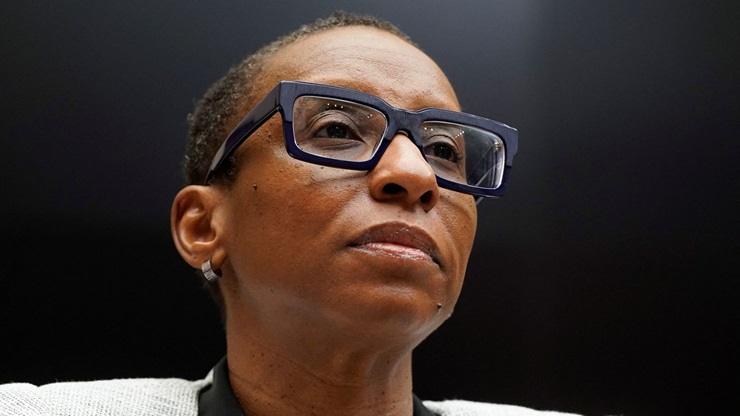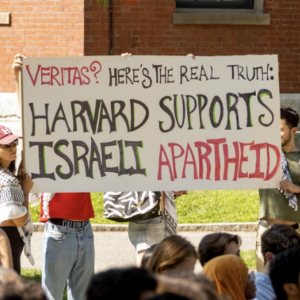Magill, Gay Are Gone, but Issue of Campus Antisemitism Lingers

The fallout from campus antisemitism that claimed the job of former University of Pennsylvania President Liz Magill is far from over, as evidenced by the ouster of Harvard’s Dr. Claudine Gay.
Gay resigned as president of Harvard University on Tuesday (though she will keep her $900,000 annual paycheck as a tenured professor), less than a month after Magill was forced out at Penn. Both Gay and Magill, along with Massachusetts Institute of Technology President Sally Kornbluth, received heavy criticism over their performance during a congressional hearing on antisemitism on their campuses. None of the three would say that “calling for the genocide of Jews” violated their schools’ code of conduct. Gay infamously claimed it depended on the “context.”
Major donors to all three schools either reduced their contributions or cut them off entirely in response.
Magill stepped down without much drama, publicly accepting her fate. Not so with Gay, the first Black woman to serve as Harvard’s president. She claimed to be a victim of racism-fueled, trumped-up charges of plagiarism.
“It has been distressing to have doubt cast on my commitments to confronting hate and to upholding scholarly rigor—two bedrock values that are fundamental to who I am—and frightening to be subjected to personal attacks and threats fueled by racial animus,” she said in her resignation statement. “These last weeks have helped make clear the work we need to do to build that future—to combat bias and hate in all its forms, to create a learning environment in which we respect each other’s dignity and treat one another with compassion…”
In fact, Gay’s minimal academic output — only a handful of published papers during her career — was riddled with nearly 50 examples of either “inadequate citations,” as her Harvard defenders called it, or outright plagiarism. “In a 2001 article, Gay lifts nearly half a page of material verbatim from another scholar, David Canon, a political science professor at the University of Wisconsin,” the Washington Free Beacon reported.
Now, some members of the Jewish community are concerned that the plagiarism issue will take the spotlight off what they see as the far more serious problem of antisemitism on America’s elite college campuses.
“The problems at Harvard have been years, if not decades, in the making,” Jeremy Burton, CEO of the Jewish Community Relations Council of Greater Boston, told Jewish Insider. “Whatever your opinion about Gay’s decision to step aside and how that came about, we would be doing ourselves a disservice if we pretend that this in any way moves us closer to resolving the root problems with the campus environment at Harvard.”
Many members of Congress agree. Magill and Gay’s responses to the “genocide of Jews” questions inspired a bipartisan House resolution heaping scorn on antisemitism on university campuses. That resolution easily passed 303 to 126 last month. However, none of the “yes” votes came from local Democratic Reps. Madeleine Dean, Chrissy Houlahan, or Mary Gay Scanlon.
Scanlon and Dean voted “no,” while Houlahan voted “present.”
Bucks County Republican Rep. Brian Fitzpatrick voted “yes.”
Penn has emerged with a reputation as one of the most antisemitism-friendly campuses in the U.S., and its problems are far from over.
Penn is being sued in federal court by two Jewish students who claim it has become an “incubation lab for virulent anti-Jewish hatred, harassment and discrimination.” That includes claiming pro-Palestinian protesters called one student “a dirty Jew” and said, “You know what you’ve done wrong.” The suit also accuses Penn faculty of “deliberate and targeted harassment” of Jewish students.
The Pennsylvania House of Representatives killed a bill last month that would have funded Penn’s veterinary school.
House Minority Leader Bryan Cutler (R-Lancaster) sent a letter to Penn leadership explaining that Magill’s resignation and a new antisemitism task force are great starts, but there’s more to be done.
“The task force’s initial report will be due in February, and the final report will be issued in May,” he wrote. “That time frame does nothing to bring about immediate change. It will not help students currently enrolled in the university experiencing this abhorrent form of hate, and it will be too late for students currently deciding whether to attend Penn.”
Please follow DVJournal on social media: Twitter@DVJournal or Facebook.com/DelawareValleyJournal



